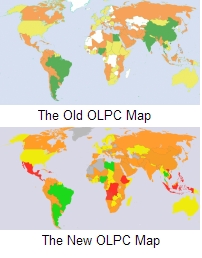Last week Walter Bender updated the original One Laptop Per Child country map. The new OLPC country map has a legend to explain country colors, showing who is in, out, and on the fence.
Interestingly, while India spurned OLPC in public, it seems that China has also dropped off of the participating countries list - it is now downgraded to "those countries who have expressed interest at the Ministry-of-Education level or higher" from "those countries we plan to pilot,"
Another country of interest is Brazil. Like its neighbor Argentina, it is in discussions for 2B1 Children's Machines, the $100 laptop's official name. Back in August, the Brazilian government announced a two month delay in testing the 2B1 computer even though OLPC said that the Brazilian government was finalizing their plans for all aspects of laptop roll-out.
Now there seems to be another disconnect. Walter Bender's October 21 News Alert says:
Brazil: The presidency has created a new working group inside the Ministry of Education to focus solely on laptops and learning. The group is comprehensive, covering all the necessary departments: basic education; teacher and content development; technology; distance support; and integration and coordination. This group will coordinate all activities needed for the deployment of laptops.Reading that, you might assume the working group is focused on the OLPC 2B1 laptop. Don't.

The Laboratory of Sistemas Integrados (LSI) of the University of São Paulo, responsible for marking out with buoys the pedagogical project of the government for use of notebooks in Brazilian colleges, received the first archetype functional from the ClassMate PC, notebook educational of the Intel.Not only is the Brazilian government giving equal billing, and testing, to the Intel Classmate PC educational system, Intel is also staging a pilot in Brazil. To quote IDG Now Brazil again:The portable one was sent to the USP for tests of the department of electronic systems, according to Roseli Lopes, coordinator of the Nucleus of Learning, Work and Entertainment of the LSI.
"In next the two months, the Intel will make a program pilot in colleges with devices functioning to check as the technology functions", affirms Max Leite, manager of the center of definition of platforms of the Intel."While not confirmed by Intel, Guilherme Felitti reports that the test will be in São Paulo state, at the Campinas and Osasco sites of the Bradesco Foundation.
And so the educational laptop wars begin! The prize: an unknown sum in the 2007 Brazilian budget for educational laptop purchases. Government sources confirm there is an amount, but aren't saying how much until the budget is revealed in March/April 2007.
Brazil will be buying computers from someone. The only questions are: From whom? And how much?



The idea of "One Laptop per Child" is very good. But even more powerfull would be "Internet access for all these Laptops". This would give access for everybody to a huge amount of the worlds knowledge.
I wonder whether OLPC's original strategy included coping with competition? If it didn't, it had better start including it - and quickly. If Brazil opts for ClassMates, that's another huge market gone on top of India and (seemingly) China. I can't see a joint OLPC/ClassMate roll out - at least one of those organisations won't be interested in interoperability...
I'm very pleased to see some sub-saharan African countries listed as second tier targets, but I am surprised by the three that are red - Ethiopia, DRC and Angola. Ethiopia is on the brink of all out war with Eritrea (via proxy in Somalia) and DRC is still attempting to broker some sort of lasting internal peace after a decade of civil war (which rumbles on in the mineral rich east). If Kabila can legitimise his presidency after the run off on 29th October (next week), then perhaps this will go ahead.
I'm doubtful. I think that Ethiopia and DRC should be coloured differently. However, if they were, that map would look a lot less promising - Ethiopia and DRC add a huge amount of red to it...
Angola on the otherhand... well, good on Angola. They could really benefit from this, though I have absolutely no idea how they could pay for it. Perhaps they will benefit from the "buy one donate one" scheme for those purchasing 2B1s in the west, or maybe the mysterious 2B1 Foundation will have something to do with laptop provision in Angola.